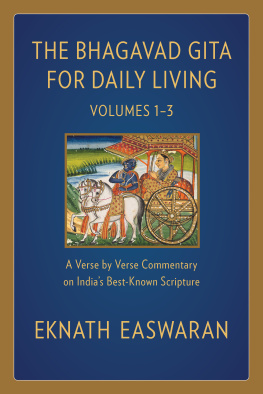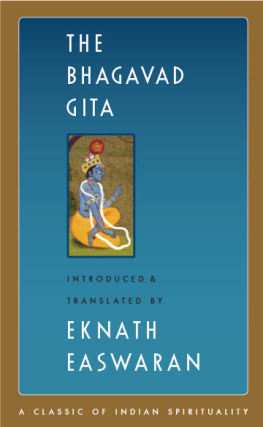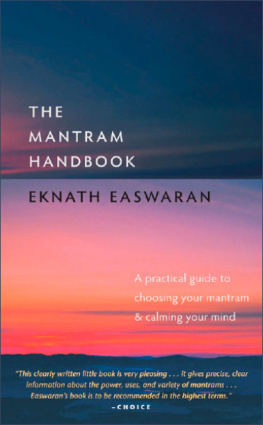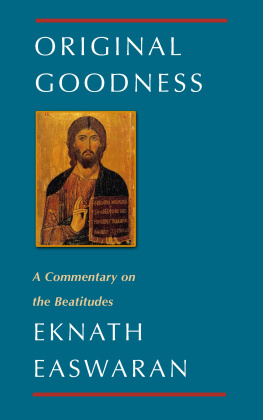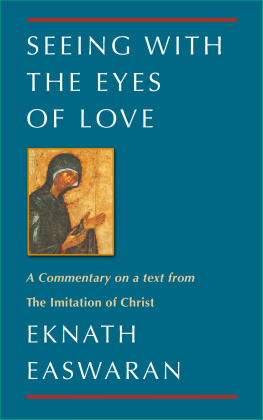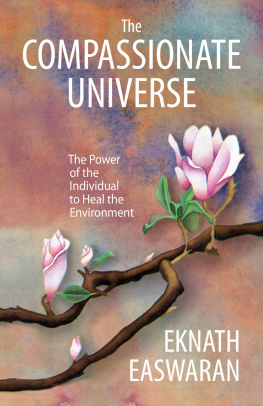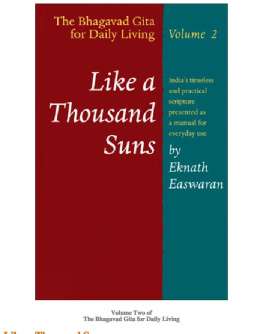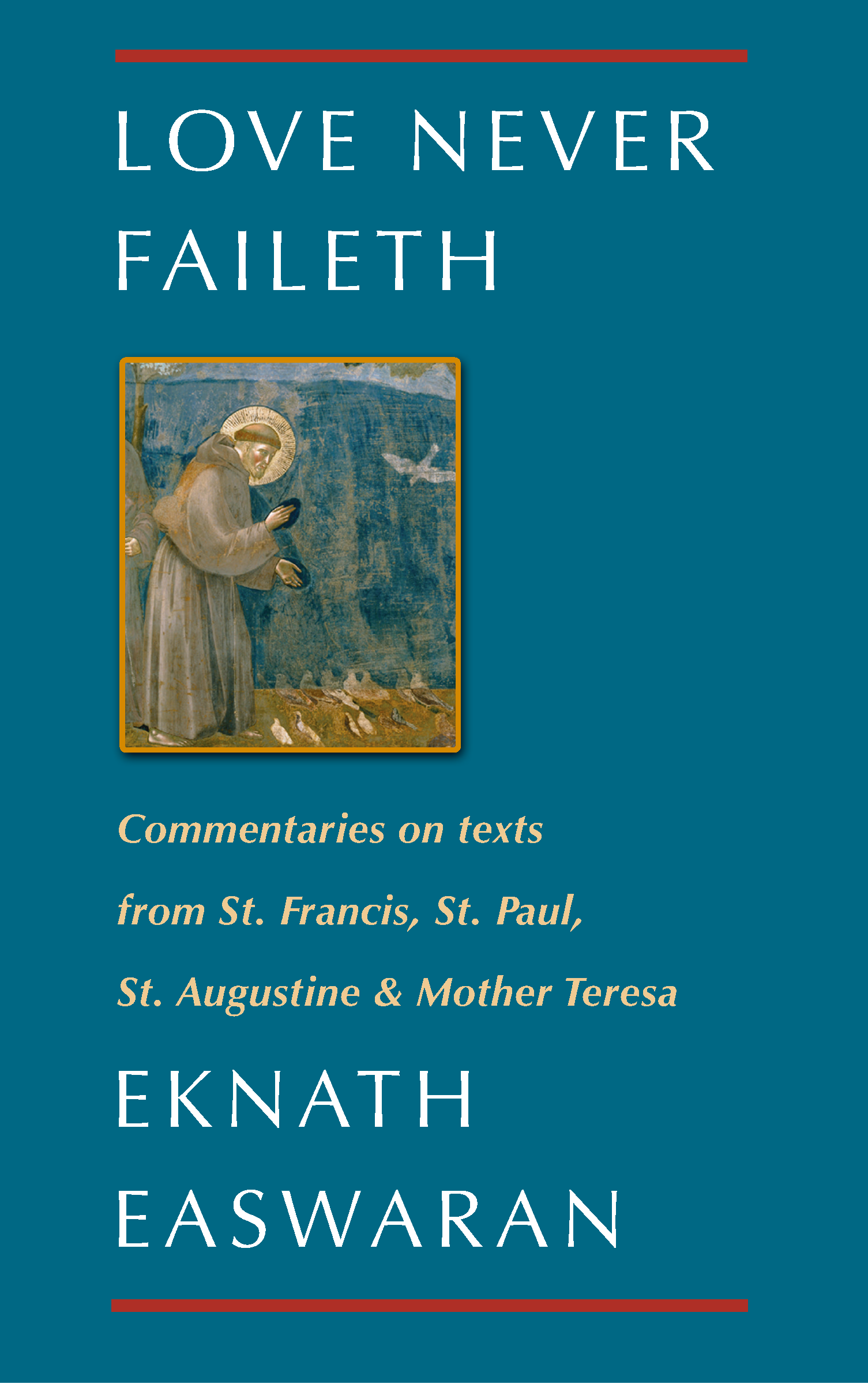Love Never Faileth
EKNATH EASWARAN
COMMENTARIES ON TEXTS FROM
SAINT FRANCIS,
SAINT PAUL,
SAINT AUGUSTINE &
MOTHER TERESA
With Introductions by Carol Lee Flinders
NILGIRI PRESS
20170531
Table of Contents
Introduction by Carol Lee Flinders
It happened to Augustine, and it happened to Francis of Assisi in a garden, to the one; to the other, in a dilapidated chapel. To Paul it happened while he was Saul the tentmaker, on the road to Damascus, engulfing him in a light so bright he saw nothing for three days afterward. And to Teresa, a Sister of Loreto, it happened as she sat on a train headed for Darjeeling happened so simply and quietly theres almost nothing to tell.
God spoke to me, they say, and their lives compel our belief. Struck down by love, charged then to live it, they are no longer Augustine or Francis or Teresa but Saint or Blessed or, to millions of Gods homeless and hungry children, just Mother. No longer a finite human being but a force, barely contained in flesh and bone. Not I, not I, but Christ liveth in me.
The pattern is never exactly the same twice. With Paul, for instance, there seems to have been a complete and radical reversal: Saul of Tarsus gone in a flash; Paul, the new man, there in his stead, and no one more surprised than he. With Mother Teresa, on the other hand, there is no sudden transformation, but a simple, gradual unfolding one long, pure, unflinching acquiescence. (Asked for legends about Mother Teresa as a young nun, one of her earliest associates protests, But there are no legends about her. Mother Teresa is completely normal.) These are extremes. Set down all similar cases and they fall somewhere between, but always there seems to be that still, small voice, coming just when its needed most.
One envies them so, these great souls who know themselves called, know without a doubt that what they are doing has divine sanction and even complicity. It is hard not to think of them as almost superhuman. Setting them apart as Saint Thus and Such only makes matters worse.
In fact, Easwarans purpose in looking at the lives and words of these individuals is not to set them apart from the rest of us, but to connect us to them, directly and vitally, in the manner of a physician readying a patient for a transfusion. Individuals like Bernard of Clairvaux, Catherine of Siena, George Fox, John Woolman, Saint Vincent de Paul, and Teresa of Avila have elevated the period of history in which they lived, and they continue to inspire even now. Yet there is nothing any of them did, Easwaran would insist, that isnt within the reach of every human being.
Years ago, when Easwaran was giving the nightly classes in meditation with which he began his work in this country, he used to enjoy describing his first and only trip to Yosemite National Park. It gave him a chance to tease without mercy the friend whod taken him there this had been his first exposure to the American passion for the Right Equipment, the Perfect Campsite, the Well-Built Fire. But he had a point to make too.
As day faded into night, he recalled, the din on the valley floor was intolerable. Transistor radios, car engines, parents and children calling out to one another you might as well have stayed in downtown Berkeley. By ten oclock, though, the last radio was turned off and the last exuberant child bedded down. Silence fell across the campground. And in the silence, audible at last, he heard the faint, murmuring music of a stream that passed just ten feet from his tent. He hadnt even known it was there.
Just so, he tells us, the still, small voice of God murmurs within every one of us all the time advising us, consoling and strengthening us an endless wellspring of wisdom and inspiration. The only reason we dont hear it as clearly as Francis or Augustine did is that weve allowed too many other noises to drown it out: the raucous voice of self-will, the clamor of selfish desire, the shrill tones of anxiety and fear. Silence them one by one, through meditation and the allied disciplines, and Franciss experience at San Damiano or Augustines in his garden will no longer seem like a fairy tale at all.
Hearing the stream is one thing: following it to the source, the clear, pure spring itself, is another. Looking at the lives of the great men and women of God, one gathers that there is a reciprocity between prayer, or meditation, and action a powerful mandate to live out what is heard in the depths of consciousness, and a deepening of the inner life each time you do. Small tasks lead outward into larger ones, the ante rising with each willing response, as the individual becomes a more and more perfect instrument of the divine will.
It is in the final stages of this process, says Easwaran, that you make an endlessly astonishing discovery. When the senses have been brought under control, when the mind is stilled and self-will extinguished and the voice youve heard just barely, just for seconds, is finally distinct loud and clear at long last you realize that it is your own. Your innermost self is inseparable from the Lord.
Each ordinary one of us, then, conceals an immense power for good. That power, the capacity for love in action, is who we really are, and we conceal it at terrible cost to the world and ourselves. Among the darkest fears of our time is that of repression. Dont repress your anger, were taught, and above all dont repress your sex drive... Yet our most powerful drive, our very identity, is closeted away hotly denied.
From this point of view, individuals like Saint Paul, Saint Augustine, Saint Francis, and Mother Teresa are spectacularly uninhibited and supremely themselves. And never has the world been in greater need of the love and strength that flows through such people. What better reason, then, to look at each in turn....
SAINT FRANCIS
Introduction by Carol Lee Flinders
The loves and writings of the great spiritual figures are so wonderfully diverse that for almost all of us one or another speaks with special force. Saint Augustine, for instance, has long been a special favorite of people with an intellectual bent those who have pressed the rational mind to its limits and said finally, No, no, there has to be more than this. To those with no intellectual pretensions whatsoever, figures like Rose of Lima or Joseph of Cupertino are particularly dear.
Francis of Assisi, though, belongs to everyone. He is the saint with whom just about everybody believes they have a special, private understanding.
Its not immediately clear why. If you really look at what he was doing and how he lived the ashes he would scatter across a dinner that looked a little too good, the single rough garment he wore, tied at the waist with a rope, the crude thrown-together huts where he and his Brothers spent long, prayerful, icy-cold winter nights if you look at it squarely, nothing could be more off-putting. Not that it was peculiar Francis only did what people have always done when they yearn to loose spirit from flesh. But it doesnt typically endear them to others.
Nor does he seem to have possessed other qualities that usually inspire a following. Crude as his assessment was, considering that he himself was a Friar, Brother Masseo can probably be forgiven for blurting out one day, Why after you? Why after you? adding in explanation, You are not beautiful to look upon; you are not a man of great knowledge; you are not of noble birth. Why, then, does all the world follow you?
Francis sought, in the words of his own Rule, to follow the teaching and the footsteps of our Lord Jesus Christ, which for him meant a life of intense and prayerful austerity. He was not the first man or woman to do so. What sets him apart, though, what keeps his memory warm and alive all over the world today and makes him perhaps the most beloved of saints, is that he made it look like fun.


